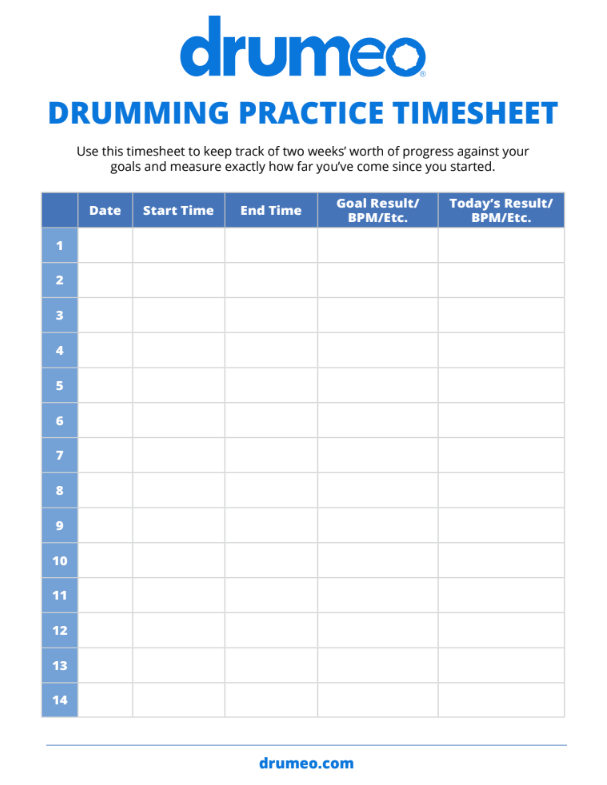
You don’t need to ‘believe’ in New Year’s resolutions to want to make a change in your drumming life. Some people don’t like to make resolutions because they think they’ll let themselves down, but here’s the wintery truth (as cold as practicing in your garage this season): any drummer can reach their goal if they know how to stick to it.
Life tends to be slower around the holidays, which means your head might be clearer than usual. If you can use that clarity to develop a more effective practice routine this year, there are ways to make sure you can actually cross your goals off the to-do list (instead of regretting flimsy resolutions).
If you’ve been telling yourself you’re going to learn that AC/DC song, improve your left hand control, or get acquainted with a new drumming style, this is the best time to do it. So here’s your recipe for resolution redemption:
If you set impossible goals – or even reasonable goals on an impossible timeline – you’re unlikely to achieve them, which will only bring you frustration and make it less likely that you’ll follow through.
How do you know if a goal is achievable?
You should be aware of your skill level and be honest about how much time you have in your schedule – otherwise you may be setting a goal or assigning it on a timeline that you won’t be able to achieve anytime soon.
If you really like structure, setting SMART goals can keep you on track:
Saying “I want to be a better drummer” is a good place to start, but it’s a big, broad target that gives you too much room and can be overwhelming. What are some components that will contribute to your improvement? How far can you break down your goal? What do you have to learn or improve on to get there?
Sometimes it’s easier to choose a song that represents your goal outcome, and figure out what you’ll need to learn or practice to nail the track.
Decide exactly what you want to accomplish and what it’ll take to get there. Then work backwards toward your goal.
Master educator Dom Famularo has some fantastic and inspirational practice tips in this hour-long lesson:
A great plan means nothing if you can’t make room in your schedule. No matter how badly you want to hit your targets, and no matter how rarely you make excuses, it may not be physically possible to put the work in if you haven’t set aside blocks of time in advance (especially if you’re a busy drummer mom or busy drummer dad).
And that’s exactly what needs to happen, whether it’s before you go to work or school, after rehearsal with the band, or when the kids are out with a relative. If you wait until you ‘feel like it’ or until you have a spare moment, you’re less likely to practice. Maybe ‘stop procrastinating’ is one of your resolutions.
You’re more likely to make quicker progress with more short practices than with fewer long practices, so if you can set aside even one 30-minute window of time per day – and actually block it out in your calendar for the next few weeks or months with a reminder on your phone – you should be able to check off all the boxes.
But if you can make it a goal to practice every single day, you’re likely to see progress sooner. Getting into a routine will also make sure you get the repetition you need for new information (and muscle memory) to stick.
When it comes to staying focused, it’s easier said than done. Everyone hopes they’ll maintain a steady track forward toward goal completion. The best way to focus is to eliminate as many distractions as possible and carefully control your environment when you’re practicing:
Many studies suggest you’re more likely to accomplish a goal if you tell someone about it (especially someone you consider successful or whose opinion you respect). But you should also be disciplined enough to hold yourself accountable. This might be tough if you’re extrinsically motivated.
But writing everything down, whether it’s on a physical calendar or as a daily phone reminder, can be a strong way to see your own message every day – and make it 42% more likely that you’ll achieve your goals. It’s the best gift you can give to yourself.
Some people find a reward system effective: “If I complete X by DATE, I’ll take myself on a trip“ or “If I practice 30 days in a row, I’ve earned that new cymbal.” If you respond better to instant gratification, give yourself smaller rewards every few days.
Other people are more likely to take action if they promise themselves a punishment should they fail to meet a goal by a certain date. If you know what best gets you motivated, do that – but only when you reach a predetermined, specific milestone.
Are you a visual person? Click here to download or print this timesheet. Write down the date, the time you started and finished your practice, the specific goal you’re trying to reach (ex. tempo, song completion, number of exercises, practice duration, etc.), and the result you achieved that day. A timesheet is one great way to visually monitor your progress and stay on track!

Samantha Landa currently drums with Conquer Divide and has been featured by outlets such as Sick Drummer Magazine and DRUM! Magazine. Sam proudly endorses Mapex Drums, Sabian Cymbals, Evans Drumheads and Los Cabos Drumsticks.


By signing up you’ll also receive our ongoing free lessons and special offers. Don’t worry, we value your privacy and you can unsubscribe at any time.
We use cookies for traffic data and advertising. Cookie Policy »